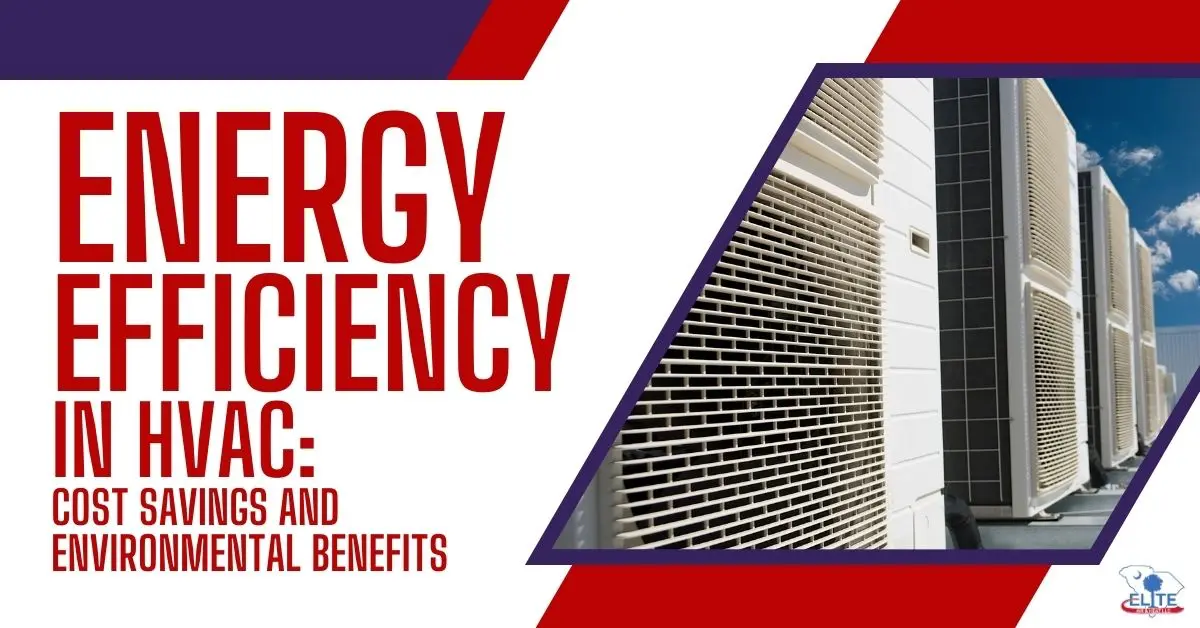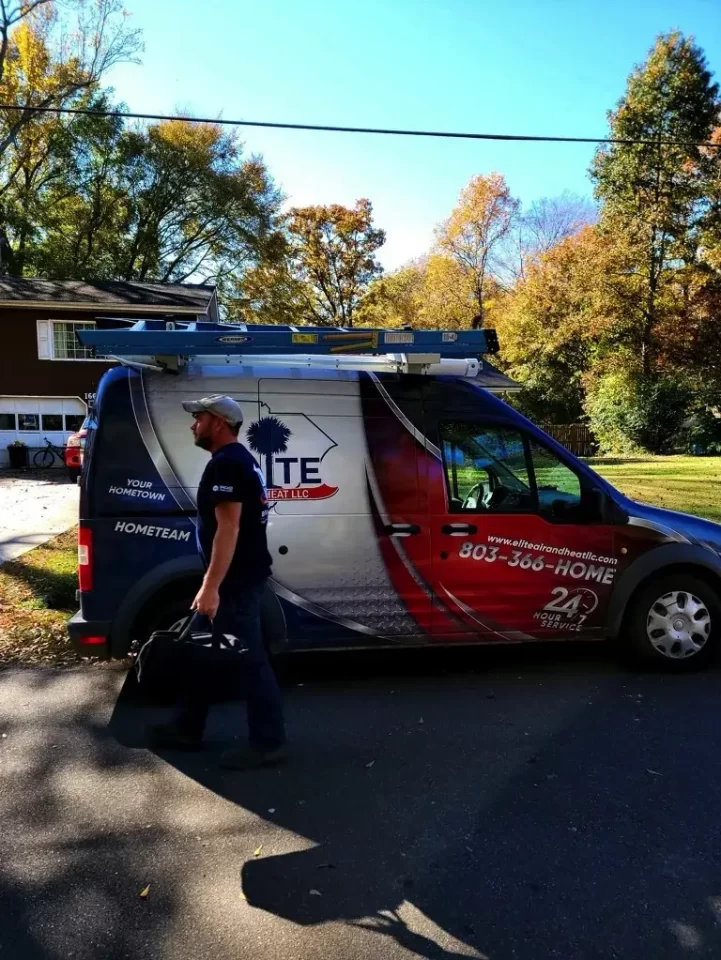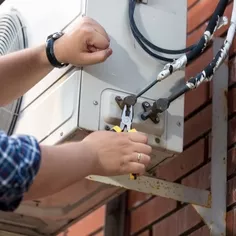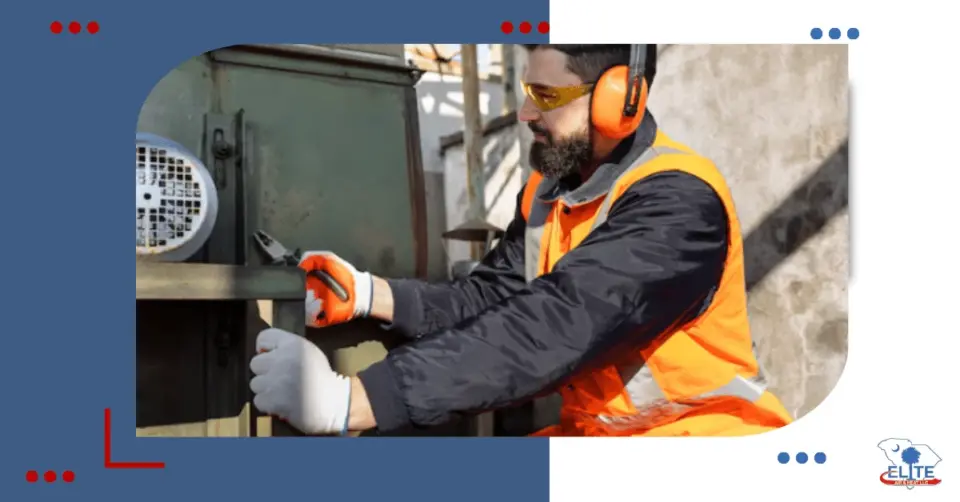Energy efficiency in HVAC (Heating, Ventilation, and Air Conditioning) systems is crucial for both cost savings and environmental benefits. HVAC systems are a good place to start looking for ways to save energy use because they use so much.
One of the key advantages of energy-efficient HVAC systems is the potential for substantial cost savings. By optimizing the efficiency of these systems, energy consumption may be drastically reduced by enterprises and homeowners lower their utility bills.
Energy-efficient HVAC systems utilize advanced technologies such as variable speed motors, smart thermostats, and improved insulation to minimize energy wastage. These innovations not only save money but also contribute to a more sustainable future.
Moreover, energy-efficient HVAC systems have significant environmental benefits. By reducing energy consumption, these systems decrease the demand for electricity, which in turn reduces the need for fossil fuel-based power generation. Thus, greenhouse gas emissions decrease helping to combat climate change. Additionally, energy-efficient HVAC systems often employ eco-friendly low-ozone-impact refrigerants global warming potential.
The benefits of energy efficiency in HVAC systems go beyond just cost savings and environmental advantages. By consuming less energy, these systems also relieve stress on the power grid, improving overall energy reliability and resilience. Furthermore, energy-efficient HVAC systems tend to operate more quietly, providing a more comfortable and peaceful indoor environment.
Energy efficiency in HVAC systems offers both cost savings and environmental benefits. By embracing energy-efficient technologies, businesses and homeowners can reduce their energy consumption, lower their utility bills, and contribute to a more sustainable future. It is clear that investing in energy-efficient HVAC systems is a wise choice for economic and environmental reasons.
How can HVAC improve energy efficiency?

There are several ways in which HVAC systems can improve energy efficiency:
- Upgrading to high-efficiency equipment: Replacing old, inefficient HVAC units with newer, energy-efficient models can significantly improve energy efficiency. Less energy is used by these devices while delivering the required heating and cooling capacity.
- Regular maintenance: Proper maintenance of HVAC systems is essential for optimal performance and energy efficiency. Regularly cleaning and replacing air filters, checking and sealing ductwork, and ensuring proper airflow can help reduce energy waste and improve overall efficiency.
- Programmable thermostats: Installing programmable thermostats allows users to set temperature schedules based on occupancy patterns. This helps avoid unnecessary heating or cooling when a space is unoccupied, resulting in energy savings.
- Zoning systems: Zoning systems divide a building into different areas, each with its thermostat control. Through the use of zone-specific temperature controls, energy can be directed only where needed, reducing overall energy consumption.
- Air sealing and insulation: Properly sealing air leaks and adding insulation to walls, attics, and ductwork can prevent energy loss. HVAC systems can operate more efficiently by minimizing drafts and maintaining a consistent indoor temperature.
HVAC systems can improve energy efficiency through equipment upgrades, regular maintenance, programmable thermostats, zoning systems, and proper insulation. Implementing these measures can help reduce energy consumption, reduce energy costs while making a positive impact on the environment.
Are energy-efficient HVAC systems cost-effective?

Yes, energy-efficient HVAC (Heating, Ventilation, and Air Conditioning) systems are highly cost-effective in the long run. While the upfront cost of purchasing and installing energy-efficient HVAC equipment may be slightly higher than traditional systems, the benefits far outweigh the initial investment.
- Lower Energy Bills: Energy-efficient HVAC systems consume less energy to achieve the same or even better heating and cooling results. This significantly lowers monthly utility bills, helping homeowners and businesses save money.
- Reduced Maintenance Costs: Energy-efficient systems often require less frequent maintenance and repairs than older, less efficient models. This further reduces ongoing operational costs.
- Longer Lifespan: Energy-efficient HVAC equipment tends to experience less wear and tear over time, resulting in fewer replacements and associated costs.
- Environmental Benefits: Beyond cost savings, energy-efficient HVAC systems support long-term environmental sustainability through cutting down on emissions of greenhouse gasses and overall energy consumption.
- Improved Property Value: Energy-efficient upgrades, including HVAC systems, can increase the resale value of a property, providing a return on investment when it’s time to sell.
While the initial investment in energy-efficient HVAC systems may be slightly higher, the long-term cost savings, extended lifespan, and environmental benefits make them a highly cost-effective choice for residential and commercial applications.
Can HVAC reduce environmental impact?

Yes, HVAC (Heating, Ventilation, and Air Conditioning) systems can significantly reduce environmental effects. Here’s how:
- Energy Efficiency: Energy-efficient HVAC systems consume less energy to provide the same level of comfort. By reducing energy consumption, they lower greenhouse gas emissions and decrease the overall environmental footprint.
- Clean Energy Sources: Some HVAC systems are designed to run on clean energy sources, such as geothermal heat pumps or solar power. These systems minimize the reliance on fossil fuels and reduce pollution.
- Refrigerant Choices: Modern HVAC systems use environmentally friendly Low-GWP and ODP refrigerants reducing their impact on the atmosphere.
- Programmable Thermostats: Smart thermostats and programmable controls optimize heating and cooling cycles, preventing unnecessary energy use and reducing emissions.
- Regular Maintenance: Well-maintained HVAC systems operate more efficiently and release fewer pollutants, helping to maintain better indoor air quality and reducing the need for frequent replacements.
By adopting energy-efficient HVAC systems, using clean energy sources, and maintaining equipment properly, individuals and businesses can reduce their carbon footprint, decrease air pollution, and contribute to a more sustainable and environmentally responsible future.
What’s the cost of upgrading to energy-efficient HVAC?
The cost of upgrading to energy-efficient HVAC systems can vary depending on several factors. These factors include building size, the type of HVAC system being installed, any necessary ductwork modifications, and the specific energy-efficient features chosen.
On average, the cost of upgrading to energy-efficient HVAC can range from $2,000 to $10,000 or more. However, it’s important to note that while the upfront costs may be higher, the long-term energy savings and potential utility rebates or incentives can help offset these expenses.
Additionally, investing in energy-efficient HVAC can lead to lowered energy use and utility bills over time, making it a worthwhile investment for many individuals and businesses.
Are there government incentives for energy-efficient HVAC?
Yes, there are government incentives available for energy-efficient HVAC systems. These incentives encourage individuals and businesses to upgrade their HVAC systems to more energy-efficient models.
One example is the federal income tax credits provided through 2032, which can provide up to $3,200 annually to lower the cost of energy-efficient home upgrades. Specific tax credits are also available for ENERGY STAR-certified gas furnaces, heat pumps, and other qualifying HVAC equipment.
These incentives vary in amount and duration, so it’s important to check with local government agencies or consult a tax professional to determine eligibility and specific details. These incentives can offset the initial cost of upgrading to energy-efficient HVAC systems while promoting sustainability and energy savings.
Our knowledgeable team assists in navigating these programs, ensuring they capitalize on available rebates and incentives. These financial perks can significantly offset the initial costs of upgrading to energy-efficient HVAC systems, making the transition both environmentally responsible and financially advantageous.





